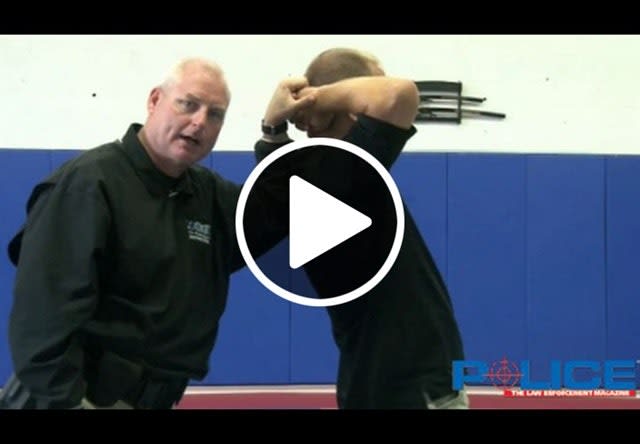VIDEO: Handcuffing with Hands On the Head
Do you handcuff your subject in the same position you used to cover or search him?
Handcuffing a suspect after asking him to place his hands on top of his head may look good on cop shows, but it puts you at greater risk. It may be effective to cover a suspect, but police combat trainer Lt. Kevin Dillon says it should be avoided for pat-downs and handcuffing.

VIDEO: Handcuffing with Hands On the Head
Do you handcuff your subject in the same position you used to cover or search him?
Effective police tactics not only give the officer the advantage; they put the suspect in a position of disadvantage. This is crucial when you're "up close and personal" with a suspect who may be planning a counterattack.
Handcuffing a suspect after asking him to place his hands on top of his head may look good on cop shows, but it puts you at greater risk. This still widely used tactic may be effective to cover a suspect, but police combat trainer Lt. Kevin Dillon says it should be avoided for pat-downs and handcuffing.
In his latest video, Lt. Dillon shows you why you should consider avoiding this tactic. The video, which you can view by clicking on the above photo, will help you limit possible counterattacks from a suspect in the "hands on head" position.
"Unfortunately sometimes we're using the same positions to handcuff that we use to cover or search," Lt. Dillon explains. "This one offers very little advantage, when you are handcuffing and/or searching … When I want to pat them down or handcuff them, that's not the position I want them in."
In the video, Lt. Dillon also explains a preferable handcuffing position, and shows you a specific way that you should position your subject's hands.
Enjoy the video. When you're done, head back to this page for links to additional videos from Lt. Dillon below.
Related:
How to Handcuff on a Wall
Integrated Baton Training (video)
Communications Skills (video)
Police Combat Tactics: Overview (video)
In the relentless heat of summer and even early fall in some parts of the country, officers face the important task of protecting their K-9 partners while working in sweltering temperatures. Recognizing changes in a dog’s behavior is the key.
Read More →ILEETA is a complete resource for trainers to address trainers' needs. Its mission is to enhance the skills and safety of criminal justice practitioners while fostering stronger and safer communities.
Read More →Technologies for improving law enforcement training and training management were some of the highlights at this year's show.
Read More →The 2024 pursuit-rated vehicles--all pickup trucks or SUVs, including two battery electric models the Chevrolet Blazer EV AWD and Ford Mustang Mach-E--were put through their paces.
Read More →As more alternative-fuel and hybrid vehicles hit the road, police and other first responders need to understand that they are no more dangerous than conventional vehicles. However, there are certain safety considerations every cop should know.
Read More →Garmont Tactical has found wide acceptance by military boot buyers, but now the company is trying to better respond to the needs of police officers. Many cops now are not fans of 8-inch boots, so Garmont is adapting.
Read More →Through our magazine and website and our Police Technology eXchange event, we promise to provide you with information and access to resources to help you do your job safer and better.
Read More →The Harris County Sheriff's Office is a model for other agencies that want to learn about crisis intervention and mental health crisis response. Sgt. Jose Gomez shares the story of their programs and provides 10 tips for mental health crisis call response
Read More →Mike Barham, of Galco Holsters, shares five important considerations to keep in mind when you buy off-duty concealed or plain-clothes carry holsters.
Read More →While the burden of accurately reporting use-of-force situations is on an individual deputy or officer, the person reviewing those reports shares in the responsibility of making sure the reporting is done properly, with clear details included.
Read More →